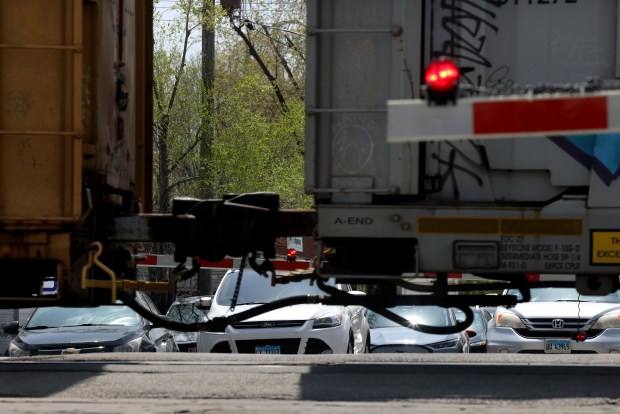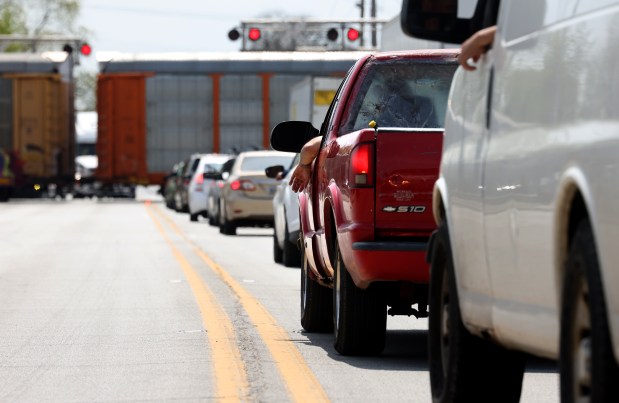To address long delays caused by stalled freight trains blocking rail crossings in Dixmoor, Cook County is funding a feasibility study for a potential roadway under Interstate 57 to help relieve congestion on Western Avenue.
The study, which began in August, is evaluating building a roadway within an existing right of way along Calumet Avenue between 141st Street and 143rd Street, according to Jesse Elam, director of strategic planning and policy for the Cook County Department of Transportation and Highways.
“Anything beats nothing,” Dixmoor Mayor Fitzgerald Roberts said. “So the grant is doing a study on it, where we can pretty much make a throughway to get around these trains. I think it’s a great move and I have great respect that they’re trying to help us with this. It’s been going on for so many years.”
The county earmarked $95,000 for the study, funded through Invest in Cook, a grant program that supports transportation projects at different stages including planning, engineering, land acquisition and construction, according to the county’s website.
Although the village applied for the grant, Elam said the county is handling the study directly under an existing consulting contract, rather than going through the typical grant approval process.
The study is funded with state motor fuel tax revenues shared with the county, Elam said.
Elam said the county has explored the feasibility of building a connecting roadway under the interstate and is now reviewing property records to determine ownership and how it might affect the project.
After the study is completed, the county will share the findings with the village and decide on next steps, Elam said.
“We want to get it done as fast as we can, but the property research part of it turned out a little more complicated than we hoped, so I think that’s really the sort of critical path item there,” Elam said. “So we hope to be able to wrap that up in the next couple months.”
The village applied for the grant in 2024 after identifying an unused right of way that could improve access to neighborhoods east of Western Avenue, Roberts said. The road is in disrepair, covered in gravel and overgrown weeds, he said.
“We looked at an old map that showed that we had Calumet Avenue going through there,” Roberts said. “We went on to find out that one of the mayors back in the day sold it or something, but it’s not on a tax roll. It hasn’t been placed on a tax roll. So basically, we want our street back.”
The project aims to create an alternate route for residents and emergency vehicles, Elam said, particularly for those in mobile home parks along Western Avenue where residents are often trapped when trains block both rail crossings at the same time.
The roadway will provide a backdoor entrance to the Colonial Estates Mobile Home Park near 142nd Street and Western Avenue, Elam said.
If the roadway proves feasible, Roberts said the village will need assistance funding construction.
According to the county, the feasibility study will also help identify potential funding sources and grants for engineering and construction.
While blocked crossings impede residents at crossings on Wood Street and Robey Avenue, residents told the Daily Southtown the problem is worse along Western Avenue, where tracks intersect the road in the 139th and 145th blocks.
Roberts said the proposed route won’t fully solve the problem, as there are other crossings without an easy route to get around the stalled trains, but called it a first step toward addressing an issue that has affected residents for years.
“We’ll be able to get from one side to the other side when the train is there,” Roberts said. “But it’s not going to completely solve it because if we have, per se, two trains on the track, you’re still gonna be blocked one way. So we’re still gonna need help.”

There is no federal statute or regulation that sets a specific time limit on how long trains can block grade crossings, according to the Federal Railroad Administration. That limits the actions the agency can take.
Meanwhile, trains have become longer due to precision scheduled railroading — a strategy used by freight rail companies to boost profits, lower operating costs and streamline service, according to the Government Accountability Office.
Roberts said he plans to seek support from legislators to help secure funding for the route and others that would allow residents to bypass stalled trains.
“There’s a lot of pieces to this, to make this project complete,” Roberts said. “This is just the first phase of getting it off the ground.”
smoilanen@chicagotribune.com



